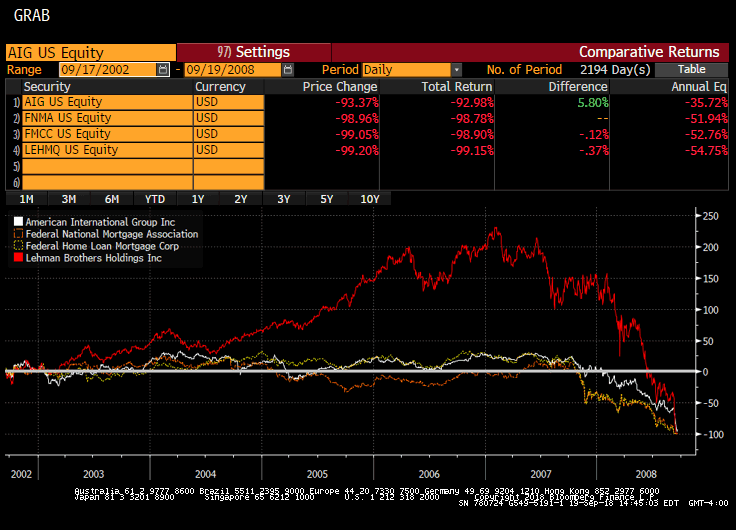Ten Years Post-Crisis, What Have We Learned?
September 2018 is the month to mark – not celebrate – the ten-year anniversary of the financial crisis. The crisis started on three specific days. First, Fannie Mae and Freddie Mac were put into government conservatorship on September 6th. Next, Lehman Brothers filed for bankruptcy on September 15th. Finally, AIG was bailed out by the government on September 16. Just recalling these events can give you the chills. What have we learned since then?
Single Stock Risk
These three fateful days and the four securities associated with them show the severe risk of placing significant wealth in a single stock. FNMA, FMCC, LEHMQ, and AIG had all been high return, high performing investments for at least a decade. All of them were thought to be safe, high growth businesses involved in lending, banking and insurance. These were not healthcare upstarts or high tech rebels. Still, all four went to zero. Zero with a Z. Anyone with a significant stake in these companies suffered far worse than investors with more diverse holdings, who suffered plenty.

Misunderstood Risk
The management of the big four crisis companies had a poor understanding of risk. For Fannie Mae and Freddie Mac, the management simply had no idea what was inside their enormous mortgage collection. As long as it was growing, the executives looked the other way on quality and verification. For Lehman Brothers, the lead partners misunderstood how much leverage they had and how much of a capital cushion they needed if their investment positions went down. LEH was levered more than 50 to 1. A 2% capital cushion is far too small for a volatile business like investment banking and securities trading. The accepted cushion today is 10% or higher. For AIG, in three months their London office sold US stock market puts that exceeded the entire capitalization of the firm – over $400 billion. Bankruptcy followed quickly when the rogue unit was unmasked.
Reckless Product Sales Distribution
In addition to poor risk management, all four firms and their shareholders suffered catastrophic losses as a result of their aggressive sales cultures. The firms had one-way compensation plans, rewarding volume and distribution above all else. The compensation plans were also increasingly tied to the stock prices so big payouts could be made to employees without using much cash. Without any checks in place on product sales, any company can run into trouble. These four crashed and burned quickly because the volume of sales was unchecked, unnoticed or unwatched.
Lehman Brothers was the prime offender regarding product sales culture. It marketed investments including a series named “100% Principal Protected Absolute Return Barrier Notes…” These products related to stocks, interest rates and currencies. The phrase “100% principal protected” made them an easy sell to customers who wished for return without apparent risk. Lehman piled on with more seemingly clever risk-free products carrying names like “enhanced yield,” “absolute barrier” and “reverse convertible.” These products, too, were backed with Lehman common stock. At the height of the “protection” production Lehman was issuing $1B of these notes per month. Underneath the Lehman sales machine, however, was a mere $20M in equity. Simply using a name that sounded safe did not make the products safe. Overselling can rapidly overwhelm a company and send it toward extinction.
Can The Crisis happen again?
Yes, it can. Will it happen again? That is unlikely. If it does happen, investors who will suffer most are those who have all their eggs in the wrong basket — a specific company or industry that fails, a bad category of bonds, a collapsing currency, a down and out commodity, or an exotic product like cryptocurrency. A diversified portfolio will fall in value, but will not completely implode. Diversification is one of those fundamental investment principals that many investors find difficult to maintain over time. We suggest taking full advantage of its benefits. We’re here to help clients dial in the right diversification for their unique investment circumstances.
At Osbon Capital, we monitor markets, products and portfolios for signs of crisis. We see few on the near-term horizon.
Let us know if you have an area you would like us to investigate. We welcome the conversation.
Weekly Articles by Osbon Capital Management:
"*" indicates required fields
